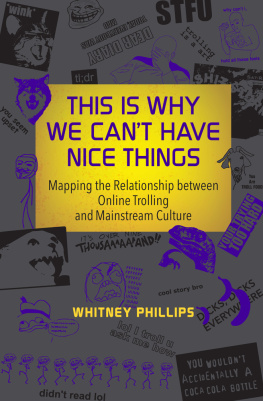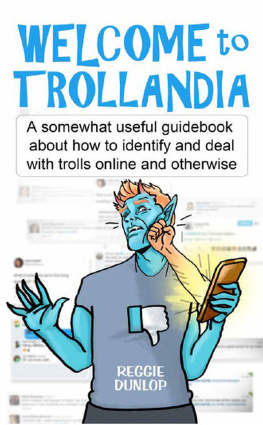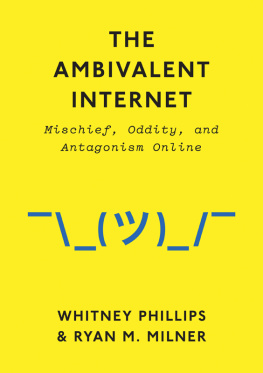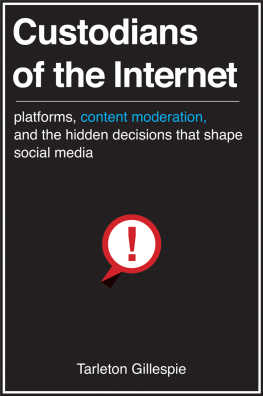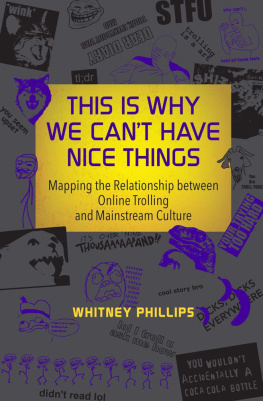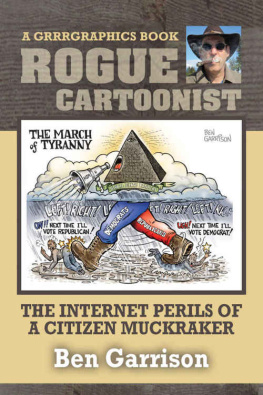This Is Why We Can't Have Nice Things
This Is Why We Can't Have Nice Things
Mapping the Relationship between Online Trolling and Mainstream Culture
Phillips, Whitney
The MIT Press
Cambridge, Massachusetts
London, England
2015 Massachusetts Institute of Technology
All rights reserved. No part of this book may be reproduced in any form by any electronic or mechanical means (including photocopying, recording, or information storage and retrieval) without permission in writing from the publisher.
Library of Congress Cataloging-in-Publication Data
Phillips, Whitney, 1983
This is why we cant have nice things : mapping the relationship between online trolling and mainstream culture / Whitney Phillips.
pages cm.(The information society series)
Includes bibliographical references and index.
ISBN 978-0-262-02894-3 (hardcover : alk. paper) 1. Online chat groupsMoral and ethical aspects. 2. Online identitiesMoral and ethical aspects. 3. Online etiquetteSocial aspects. 4. InternetSocial aspects. 5. InternetMoral and ethical aspects. 6. Internet users. I. Title.
ISBN 978-0-262-32900-2 (retail e-book)
HM1169.P45 2015
302.23'1dc23
2014034232
10 9 8 7 6 5 4 3 2 1
d_r0
To J. S.
Acknowledgments
Since beginning this research in 2008, Ive been surrounded by an incredible group of friends, family members, colleagues, and mentors. I am deeply grateful to everyone who contributed to the project and to all those who encouraged me throughout the process.
I am particularly indebted to my parents Dennis and Carol Phillips (first set) and Sami and Steve Salvatori (second set) for their unconditional love and willingness to listen to me rattle on about trolls, lulz, and that which cannot be unseen on the Internet for the past six years. Also, sorry about that.
Countless thanks to Chris Menning, Greg Leuch, Alex Leavitt, Tim Hwang, Mike Rugnetta, Frank Tobia, Erhardt Graeff, Seth Woodworth, Jamie Sherlock, Christina Xu, Stephen Bruckert, Jamie Wilkinson, Dharmishta Rood, Matt Morain, Don Caldwell, Amanda Brennan, Brad Kim, danah boyd, Alice Marwick, Tricia Wang, Danielle Citron, Kelly Bergstrom, Lee Knuttila, Luke Simcoe, Jiashan Wu, Sam Ford, Molly Sauter, Jessica Beyer, Brent Nash, Erik Markovs, Clint Springer, Austin Song, Josh Suyemoto, Natalie Morris, Hatty, Brian Psiropoulos, Lauren Bratslavsky, John Fenn, Daniel Wojcik, Monica Stephens, Stuart Geiger, and Katie OConnor for being thoughtful readers, respondents, and cheerleaders at various stages of the research project; Lynnika Butler, Karen Wade, and Kate Miltner for their heroic eleventh-hour edits; Gabriella Colemans Technological Underworlds class at McGill University for providing excellent and much-appreciated revision suggestions; my dissertation committee, which was composed of Carol Stabile, David Li, Doug Blandy, and Lisa Gilman, for their support and extraordinarily helpful comments; the anonymous reviewers through whose capable hands this manuscript has passed; Amanda Ford for coordinating the piles of letters and logistics Ive needed sorting over the years; the various trolls who participated in my research, most notably Paulie Socash, Peter Partyvan, Wilson Mouzone, Soveri Ruthless, Frank Bagadonuts, and Pro Fessor; everyone in the University of Oregons Folklore Program; the always helpful English Department office staff, with honorable mention going to the administrative oracle known to mortals as Michael Stamm; Maxwell Schnurer, chair of the Communication Department at Humboldt State University, for providing such amazing support in the run-up to this books publication; and of course the editorial, design, marketing, and legal wizards at the MIT Press, particularly former Senior Acquisitions Editor Marguerite Avery, former Assistant Acquisitions Editor Katie Persons, manuscript editor Kathleen Caruso, and jacket designer Molly Seamans for their enthusiasm and support, and for helping me noodle through all eight hundred thousand of my questions.
As this book is the culmination of my undergraduate and graduate training, it is appropriatenecessary, evenfor me to thank the professors and mentors who have influenced me and my work most strongly: John Powell for challenging and enriching my understanding of academic argument; Jonathan Aaron for encouraging me to embrace a writing style that is wholly mine, and for upending my understanding of the traditional essay; Lisa Gilman for introducing me to ethnographic research methods, and for pushing me to think critically and carefully about the politics of trolling; Henry Jenkins for believing in me, and for providing generous and thoughtful critiques from the projects inception to the very last round of revisions; and Biella Coleman for the camaraderie, spot-on feedback and advice, and of course, for the lulz.
I also offer my sincerest and most effusive thanks to Bryce Peake for the constant inappropriate laughter (bivtron, bunnies, and palm fronds, oh my) and for being my favorite part of graduate school; Shane Billings for the precious PLC memories and brutal line edits; Tony and Mrak Unger for being my family away from home; Chelsea Bullock for the cross-room eyebrow raisings (#spoilers); Katie Nash for her special oats; Maurene Goo for keeping the Boston legacy alive; Patrick Davison for being a frolicsome Internet .gif buddy and solid, kind, supportive friend (also Hi Michelle! Hi Doc!); Kate Miltner for the fireside cyberchats; Karen Wade for the blog parties (you had me at pineapple upside dump cake); Lynnika Butler for the surreptitious texting and beautiful wagon wheel light fixture; Ryan Milner for the various hats he wears, most importantly friend, coauthor, and Scully of merciless proportions; Hilary Maroney for her toughness, generosity, and uncanny ability to say the exact same thing at the exact same time, like were sisters or something (puuuublix); Cullen Maroney for appreciating our family jokes even when they arent normal (How do unique up on a rabbit?) and for being an all-around excellent addition to our lives; David Phillips for teaching me everything I know, and for giving the best wedding toast in the history of recorded marriage (Ive only met Whitney once, in 1986, in Miami, he began, despite the fact that he grew up with me, has never been to Miami, and was born in 1989); and Nathan, my young wolf, for helping me explore the forest trails, pushing me always to go further and faster, and at the same time reminding me to slow down and be present.
Finally, to the unsinkable, incomparable, honeybadger of my life, my PhD advisor and hero Carol Stabile: I couldnt have written this book without you, full stop. You have supported, protected, and encouraged me in ways that have changed how I see and engage with the world, and your uncompromising feedback and fierce advocacy have provided me with a model for how I hope to advise my own students. I cannot tell you how lucky I feel to have worked with you, and how grateful I am for your friendship. Plus you made me that weird cake I like. You are amazing. Thank you.
Introduction
Project Origins
I first encountered trolling in the summer of 2007, after my then eighteen-year-old brother recommended I spend some time on 4chans /b/ board, one of the Internets most infamous and active trolling hotspots. You should check it out, he kept insisting. Youll like it. Eventually I caved (how bad could it be?), and one fateful afternoon decided to see what all of the fuss was about. I parked myself in front of the computer, found my way to 4chans front page, and as my brother had instructed, clicked on the /b/-Random board. After ten minutes of scrolling through the seemingly infinite stream of nameless, faceless postsnearly everything I saw was attributed to AnonymousI was ready for a break. A break, a shower, and a nap. There was so much porn and gore, so much offensive, antagonistic humor, and so much general foulness I could hardly process what I was seeing. Nor could I understand why my brother, a smart, thoughtful, and generally easygoing kid, would find this space so amusing. Because what was even happening? What language were these posters speaking? And what, exactly, was a Pedobear?
Next page
